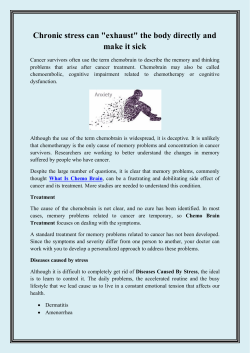
New study shows how immune cells hone their
New study shows how immune cells hone
their skills to fight disease
2 February 2015
boost," said TSRI Professor Michael McHeyzerWilliams, senior author of the new study.
How Immune Memory Functions
When a virus attacks the body, the immune
system's B cells produce antibodies to bind to and
disable the current invader. At the same time, a
squadron of memory B cells heads to special areas
of the lymph nodes. These memory B cells will be
trained to recognize even tiny amounts of the virus
if it ever attacks again.
The Scripps Research Institute's Professor Michael
McHeyzer-Williams and Senior Scientific Associate
Louise McHeyzer-Williams are authors of a new study
shedding light on how booster shots offer long-term
protection from viruses. Credit: The Scripps Research
Institute
The last time you were in the doctor's office for a
vaccine booster shot, did you wonder why you
needed one? Exactly how booster shots offer longterm protection from viruses has long been a
mystery to scientists.
Now, a new study from scientists at The Scripps
Research Institute (TSRI) helps explain how
booster shots prompt immune "memory" to
improve, an important step toward the
development of more effective, longer-lasting
vaccines. The findings were published online
ahead of print on February 2 in the journal Nature
Immunology.
"We can now see the evolution of better protection
in single memory cells as they respond to the
Once memory B cells arrive in the germinal centers
of the lymph nodes, they are cloned, and each
clone receives a random mutation to its B cell
receptor (a protein that interacts with viruses).
Although some of the mutations are useless, others
lead to even more effective antibodies.
Each mutated memory B cell is then tested against
a part of the virus. If its antibodies pass the test and
bind even better to the virus, the B cell will
eventually be released into the body to patrol for
invaders. Memory B cells can go through the same
process to train against bacteria, fungi and other
pathogens.
Scientists have long known that memory B cells
produce more effective antibodies each time they
encounter a virus—that's why most vaccines require
"booster" shots. But until now, scientists didn't know
all the stages of training that take place in the
lymph nodes.
"You develop memory so that the next time you see
it, you clear the infection more quickly," explained
McHeyzer-Williams. "But the cellular and molecular
details of memory are not well understood."
Training Never Stops
1/3
In the new study, the researchers injected mouse
models with a substance ("antigen") to prompt an
immune response. Using a technique called flow
cytometry, they collected single memory B cells
four and eight days after injecting an antigen boost.
Provided by The Scripps Research Institute
After collecting about 700 individual memory B cells
from germinal centers, the team directly associated
the proteins expressed, sequenced the genes from
the individual B cell receptors and measured 96
other genes from each single memory B cell. This
approach provides a more complete picture of
memory B cell evolution than previously possible.
The researchers demonstrated a wide range of
mutations in responding memory B cells, showing
that the body was trying out many different survival
strategies—it was evolution on a cellular scale. "A
diverse immune response may be advantageous
because viruses and other pathogens are also
continually evolving," explained McHeyzerWilliams.
The scientists also found that cells were
undergoing different parts of the training process in
an ordered progression of gene expression,
showing new features of the training programing
and how antibodies evolve after vaccine boosts.
"The training is actually ongoing; they keep on
training and keep getting better at their task," said
TSRI Senior Scientific Associate Louise McHeyzerWilliams, who was co-first author of the paper with
Pierre Milpied, a TSRI research associate at the
time of the study.
With these new findings, the researchers think
booster shots could be better designed to
manipulate the memory system. "What you add to
the boost makes a difference to the balance of cells
and the rate of mutation," said Michael McHeyzerWilliams.
More information: Switched-memory B cells
remodel B cell receptors within secondary germinal
centers, DOI: 10.1038/ni.3095
2/3
APA citation: New study shows how immune cells hone their skills to fight disease (2015, February 2)
retrieved 6 February 2015 from http://medicalxpress.com/news/2015-02-immune-cells-hone-skillsdisease.html
This document is subject to copyright. Apart from any fair dealing for the purpose of private study or research, no part
may be reproduced without the written permission. The content is provided for information purposes only.
3/3
Powered by TCPDF (www.tcpdf.org)
© Copyright 2026











